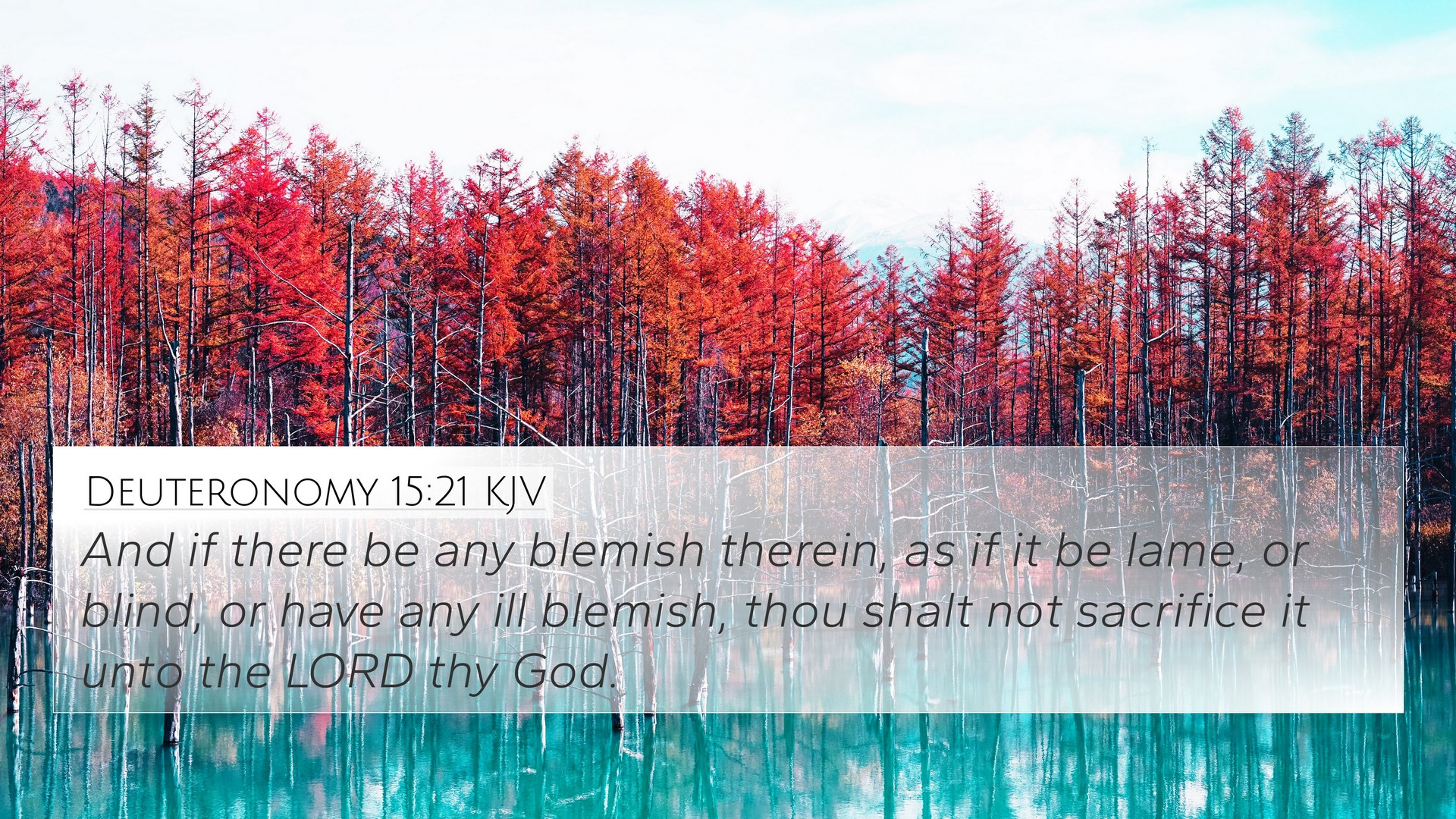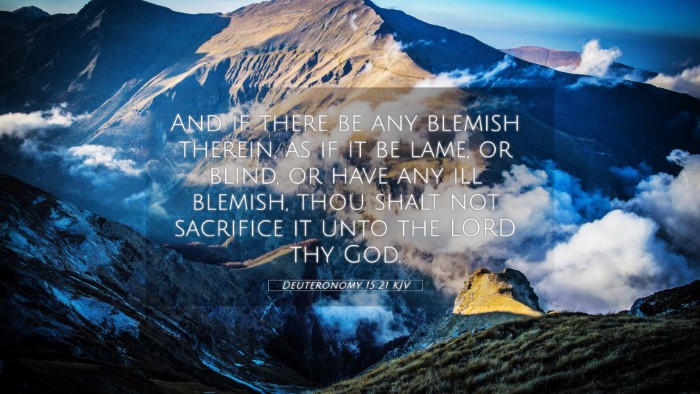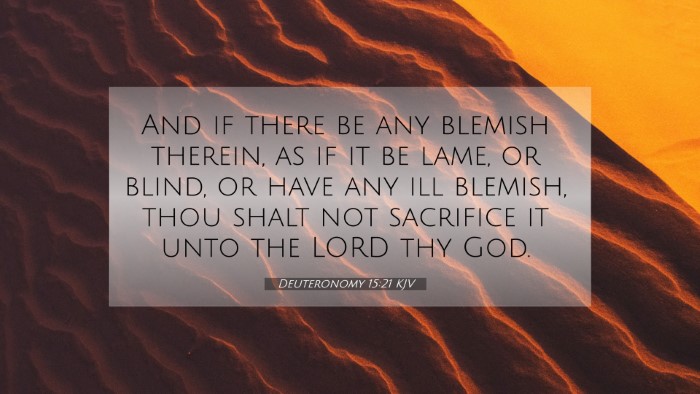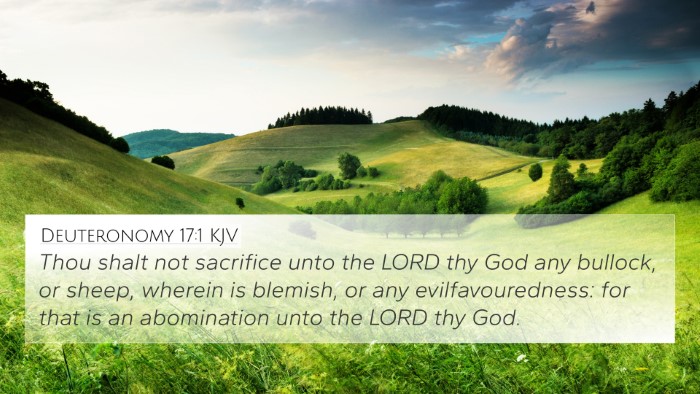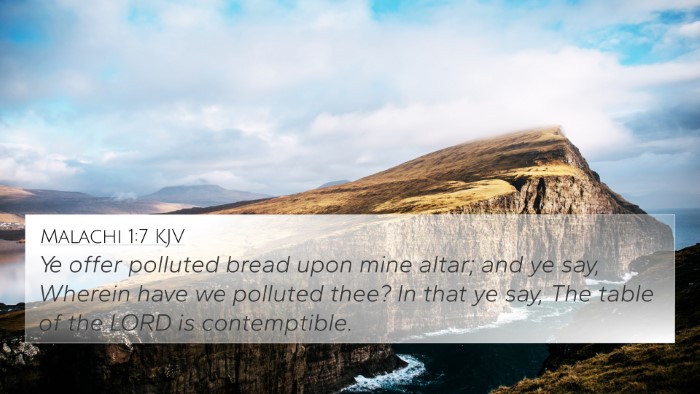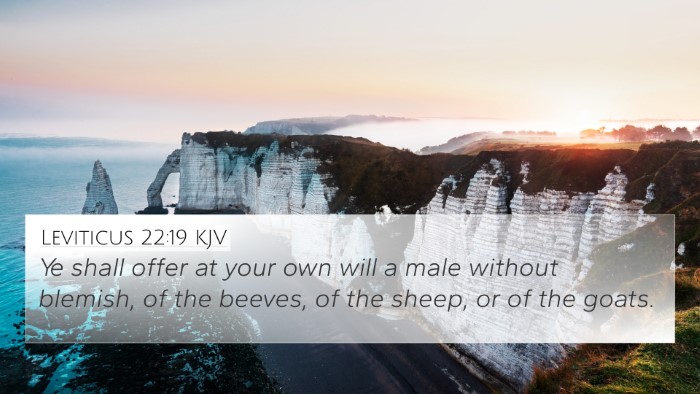Understanding Deuteronomy 15:21
Deuteronomy 15:21 states:
"And if there be any blemish therein, as if it be lame, or blind, or have any ill blemish, thou shalt not sacrifice it unto the LORD thy God."
This verse speaks to the standards of sacrifice that God demands from His people, emphasizing the importance of offering only the best to Him.
Summary of Meaning
In this passage, we find a clear directive concerning the condition of animals offered as sacrifices. This reflects the broader principle of holiness and purity in worship, which follows the theme of addressing what is worthy to present before God.
Insights from Public Domain Commentaries
-
Matthew Henry:
Henry emphasizes that God desires sacrifices that reflect His holiness. The blemishes symbolize sinfulness and imperfection, suggesting that believers should also present their lives and offerings without blemish, striving for spiritual purity.
-
Albert Barnes:
Barnes highlights the Old Testament system of sacrifices, portraying the importance of unblemished offerings, which foreshadow the ultimate sacrifice of Christ—perfect and without sin. He notes that physical blemishes represent the spiritual defects that should be avoided.
-
Adam Clarke:
Clarke elaborates on the ceremonial laws of Israel, explaining that presenting unblemished animals served as a sign of obedience to God's commands, and this principle translates to offering our best in worship today, with an emphasis on sincerity and devotion.
Bible Verse Cross-References
Deuteronomy 15:21 relates to several key verses in the Bible, which shed more light on the theme of sacrifice, purity, and dedication to God:
- Exodus 12:5: "Your lamb shall be without blemish, a male of the first year." This emphasizes the requirement for purity in offerings.
- Leviticus 22:20-24: Discusses the unacceptable nature of blemished offerings and reinforces the call for perfection in sacrifices.
- Malachi 1:14: Speaks against offering polluted sacrifices to God, stressing the importance of honor when presenting to the Lord.
- 1 Peter 1:19: References Christ as a lamb "without blemish and without spot," connecting the Old Testament sacrificial system with the New Testament's fulfillment in Christ.
- Hebrews 9:14: Describes how the blood of Christ, being without blemish, purges our conscience from dead works, highlighting the significance of His perfect sacrifice.
- Romans 12:1: Encourages believers to present themselves as living sacrifices, which ties back to the idea of giving our best to God.
- Psalms 51:17: "The sacrifices of God are a broken spirit; a broken and contrite heart." This establishes the importance of attitude in worship.
Connections Between Bible Verses
Connecting Deuteronomy 15:21 with other scriptures provides a deeper understanding:
- Thematic Connections: Each mentioned verse emphasizes the call for purity, both in the physical act of sacrificing animals and spiritually in our hearts and lives.
- Inter-Biblical Dialogue: The principle of offering without blemish transcends the Old Testament, informing New Testament Christian practices, where believers are called to embody this principle through holiness in their lives.
- Comparative Analysis: The consistency between the Old and New Testaments illustrates God’s unchanging nature and His desire for His people to come before Him blameless.
Conclusion
Deuteronomy 15:21 provides valuable instruction on worship and sacrifice, reinforcing that God desires our best—free from blemish—symbolizing a life surrendered to Him. This call for purity in offerings serves as a significant theme throughout the scriptures, culminating in the perfect sacrifice of Jesus Christ.
Tools for Bible Cross-Referencing
For those seeking to explore and understand the connections between Bible verses, the following tools can be valuable:
- Bible Concordance: Helps locate specific terms and their occurrences across different scriptures.
- Bible Cross-Reference Guide: Provides a system to track thematic or contextual links between verses.
- Cross-Reference Bible Study: Engaging with scripture in a way that uncovers relationships and deeper meanings.
- Bible Reference Resources: Various materials and tools that facilitate the exploration of scriptural cross-references.
- Comprehensive Bible Cross-Reference Materials: Detailed studies and guides that connect scriptures thematically and textually.
Further Study Suggestions
To deepen your exploration of this theme, consider:
- Identifying connections between the Old and New Testament: Examine how sacrificial themes evolve and culminate in Christ.
- Cross-referencing Psalms with New Testament teachings: Explore the fulfillment of Old Testament prophecies and principles in the life and teachings of Jesus.
- Comparative study of Pauline epistles: Analyze how Paul addresses the concept of spiritual sacrifice in letters to early churches.
